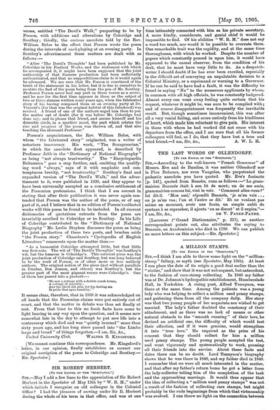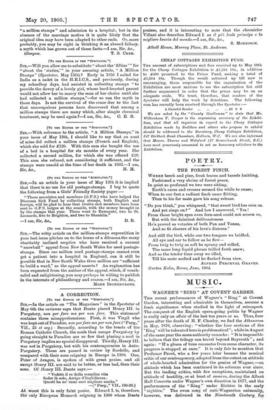A MILLION STAMPS.
[TO THE EDITOR OP THE "SPECTATOR."] SIR,—I think I am able to throw some light on the " million- stamp " fallacy, or myth (see Spectator, May 13th). At least I can place the date of its origin a good deal earlier than the " sixties," and show that it was not subsequent, but antecedent, to the fashion of rare-stamp collecting. In 1848 my father was at Dr. Johnson's hydropathic establishment, Humberslade Hall, in Yorkshire. A rising poet, Alfred Tennyson, was there at the same time. Among the patients was a young lady who was helping to collect a million used penny stamps, and gathering them from all the company daily. Her story was that two young people of her acquaintance wished to get married. The lady's father doubted the constancy of their attachment, and as there was no lack of means or other natural obstacle to the " smooth running " of their love, he devised an artificial one, the difficulty of which would test their affection, and if it were genuine, would strengthen it into " true love." He required as the price of his consent that they should collect or him a million used penny stamps. The young people accepted the test, and went vigorously and systematically to work, pressing all their friends into the service. About these facts and dates there can be no doubt. Lord Tennyson's biography shows that he was there in 1848, and my father died in 1849. I remember that we were all much interested in the matter, and that after my father's return home he got a letter from the lady-collector telling him of the completion of the task and the approaching marriage. It would thus appear that the idea of collecting a " million used penny stamps " was not a result of the fashion of collecting rare stamps, but might probably be the rude beginnings from which that virtnosoship was evolved. I can throw no light on the connection between
"a million stamps" and admission to a hospital; but in the absence of the marriage motive it is quite likely that the original idea may have been adapted to other ends. Or, more probably, you may be right in thinking it an absurd fallacy, a myth which has grown out of these facts.—I am, Sir, &c.,







































 Previous page
Previous page